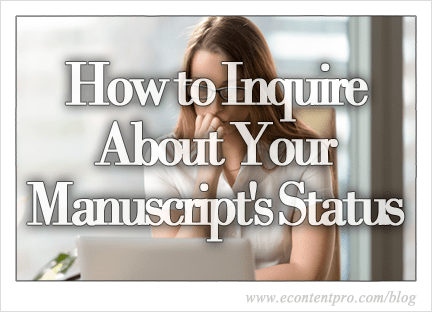
Should I write to the editor, ask the publisher, or wait a few more weeks? With our knowledge of the workflow that editors and publishers operate under, we offer this background information and guidance on how to appropriately check your submission status.

After Submission: Why Can’t I Know Right Away?
Frankly, waiting is a part of being an author—whether you’re a scholarly researcher or a fiction writer. Most academic journal and book editors work for little or no pay and are continuously struggling to manage their time between professorship duties and editorial responsibilities; so, time is limited to say the least.
One of the most important factors about manuscript submissions is that, often, the editorial process is dependent upon the subject area. In order to adequately prepare yourself, ideally, you should identify your target journal’s development timelines before submission. Look up the average wait times for your area of research. For instance, mathematics-focused journals have notoriously long manuscript review times, while education-centered books are generally quick and efficient at assessing proposals.
Who Do I Contact?
Every publishing company sets forth different policies, workflows, and submission guidelines that editors are usually required to follow, so doing some research into the publisher’s standard submission practices should be your first reaction. While one publishing house may ask you to contact the editors directly, others may encourage communication with a staff person who acts as a development liaison. Also, across the board, it’s likely that lead editors have appointed managing editors, who may very well be your key point of contact.
One foolproof method of discovering the correct person to contact is to email the publisher’s customer service representative. Typically, they will respond within two days and will point you in the right direction for what you’re inquiring about.
How Long Should I Wait Before Following Up With the Book or Journal?
It can be quite nerve-wracking when you’ve submitted research that you’ve put tremendous effort into only to hear silence from the book or journal editors.
Let’s explore the average amounts of time that academic books and journals take before responding. For journals, the “initial assessment” period should take anywhere between 2 and 16 weeks. Yet, the completion of this step doesn’t necessary warrant a communication to you as the author; again, it depends on the publisher’s practices and submission system. For books, if you’re waiting on a response for a proposal, expect a fairly quick reply since editors are eager to accept quality proposals and thrust you into the process of writing a fully developed submission. For full book submissions, editors are now moving into the peer review phase, which takes time, time, and more time.
Most would agree, peer review is by far the most cumbersome stage of the entire book or journal development process. Here’s why. Editors have to recruit reliable reviewers who are qualified. Then, those reviewers need to accept the request from the editors, and then complete the full evaluation. In many cases, the pool of reviewers becomes thinner and thinner with each of the aforementioned steps, and it’s largely frowned upon to make a final editorial decision with only one or two reviews, which sometimes aren’t even completed to the extent that would allow the editor to make an informed decision.
In sum, don’t expect a speedy turnaround after your manuscript is initially accepted. Nevertheless, after not hearing anything for the 16-week maximum average wait time, it’s acceptable to reach out to the right point of contact.

How Should I Follow Up?
After about four months, it’s our recommendation to write a status inquiry. There should be no harm in doing so; showing continued interest in having your manuscript published demonstrates engagement and erases any worries of plagiarism or simultaneous submission. Most importantly, though, be sure to maintain a tone of patience and politeness throughout your email communication. No one responds well to aggression, and remember, you have no entitlement in this situation. Still, most journal or book editors have once been or are still in your shoes, and the most effective editors have sympathy for authors of content that they deem exceptionally suitable for their publication.
Keep it concise and to the point. Structure your email similar to this template:
Dear Dr./Prof. [journal/book editor(s) full name(s)]:
Greetings! I hope this message finds you well.
I’m writing in regards to my/our manuscript, “[Manuscript Title],” submitted on [Date of Submission] to your respected journal, the [Title of Book/Journal].
To date, we have not received a notification regarding the status of our manuscript. I understand that you must be extremely busy, but could you please let me/us know approximately when we can expect a decision from you or the editorial board?
Thank you for your time and attention.
I/we look forward to hearing from you shortly.
Sincerely,
Your Name(s) and Signature(s)
The Bottom Line
Editors receive hundreds to well over a thousand manuscripts every year. Despite policies in place and the efforts of many, the ball is bound to be dropped at times when it comes to processing submissions—even if the publisher’s submission system is state of the art.
All in all, patience is key, but after a reasonable amount of time, bad news is better than no news.

About eContent Pro
Based in Hershey, Pennsylvania, USA, eContent Pro offers high-quality end-to-end editorial and publishing services, ensuring seamless workflows through the eContent Pro Business Enterprise Management System (BEMS), fast turnaround times, competitive pricing, and exceptional customer service. Since 1994, we have supported commercial publishers, university/library presses, organizations, and societies by streamlining their publishing workflow with innovative publishing solutions.